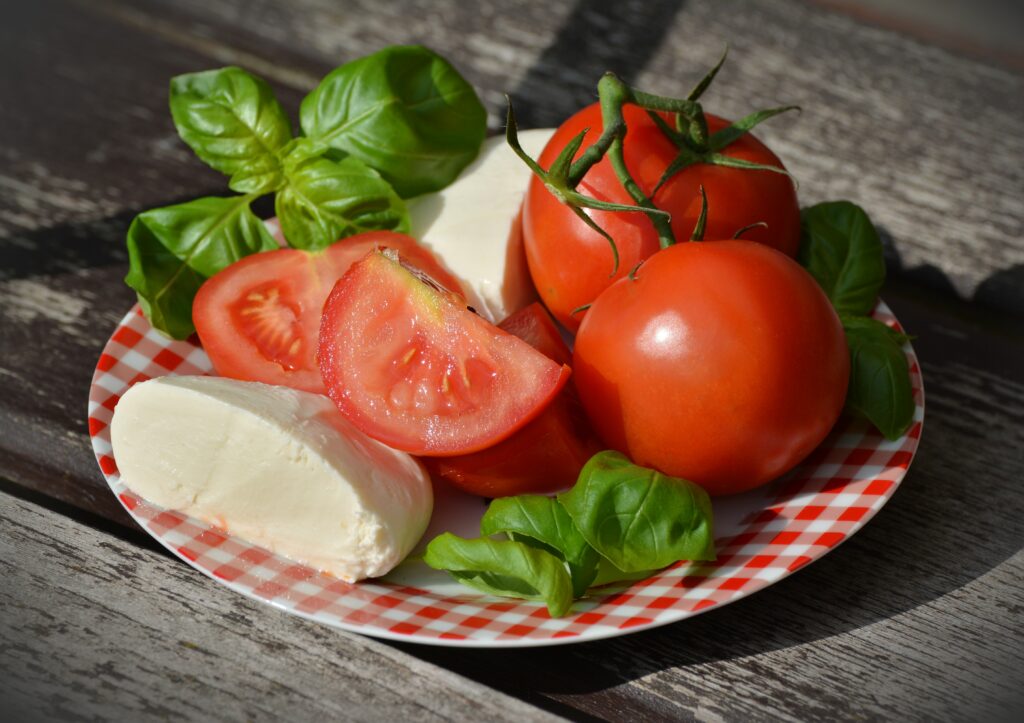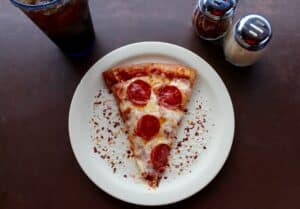Last Updated on July 3, 2023 by Steven Root
Introduction
I’ve seen so many articles giving poor answers to the question of whether or not you can eat pizza with ulcerative colitis. Everybody is dancing around the truth of the matter. So in this article I’m going to give it to you straight.
This article will cover:
- Ulcerative Colitis: A Closer Look
- Can You Eat Pizza With Ulcerative Colitis?
- The Role of Dairy in Autoimmunity
- Gluten: Friend or Foe in Autoimmunity?
- Nightshades and Autoimmunity
- Enjoying Pizza With Ulcerative Colitis
What Is Ulcerative Colitis?
Ulcerative colitis is an autoimmune disease that affects the large intestine. Characterized by inflammation and ulcers in the lining of the colon, it leads to symptoms such as
- abdominal discomfort
- frequent, urgent, and often bloody bowel movements
- systemic issues, and more.
Can You Eat Pizza With Ulcerative Colitis?
In the interests of being as up front as I possibly can with you:
If we’re talking about “normal” pizza,
then yes, but you shouldn’t.
If you found this disheartening, read on. Because all is not lost and if you’re happy to make pizza at home then I have some ideas for you later on in this article.
Unfortunately pizza has just about everything in it that can trigger an immune response:
- Dairy
- Gluten
- Nightshades
Let’s unpack each of these in a bit more detail.
Autoimmunity And Dairy

The response to dairy varies from person to person. It often depends on an individual’s unique physiological response and whether or not they have any other concurrent digestive conditions, like lactose intolerance.
Unlike most people think, it is often the casein in dairy that is the problem for people with ulcerative colitis, not the lactose.
In a bit more detail:
Casein is a protein found in milk and dairy products. Some research has suggested that casein, mainly A1 Beta Casein, may provoke an immune response in certain individuals, potentially worsening symptoms in those with autoimmune conditions (source).
On the other hand, lactose is a type of sugar found in milk and dairy products. Lactose intolerance is a condition where the body is unable to fully digest lactose, resulting in symptoms such as bloating, diarrhea, and gas.
If you are lactose intolerant, then often hard cheeses will be okay for you, such as-
- Cheddar
- Colby
- Swiss
- Mozzarella
- Monterey Jack
- Parmigiano Reggiano and other aged cheeses
People with IBD may have co-occurring lactose intolerance, however this is different from an autoimmune response.
Overall, avoiding dairy if you have ulcerative colitis is a good idea.
Some people find that they can tolerate forms of dairy that do not contain the A1 Beta Casein protein in large amounts. Examples include
- goat’s milk
- sheep’s milk
- and cow’s milk where the herd has been tested and is known to produce only A2 proteins
However, pizza bought from supermarkets or from restaurants will typically always have large amounts of the troublesome A1 protein.
Autoimmunity And Gluten
Gluten, a type of lectin found in grains such as wheat, barley, and rye, is also found in large amounts in pizza. There is substantial evidence that gluten increases gut permeability, thereby stimulating an immune response and contributing to inflammation in susceptible individuals (source).
Gluten-free pizza options are becoming increasingly available and may be a good alternative to consider depending on which one you choose.
Although, a growing body of evidence shows that even gluten-free alternatives such as buckwheat, millet, amaranth, sorghum etc may cause many of the same issues, since these are typically also high in lectins.
Autoimmunity and Nightshades

Not everyone is intolerant to the lectins, saponins, and capsaicin found in nightshades. However nightshades are widely known to be troublesome for many people with gut issues, including those dealing with autoimmunity.
Studies specifically identifying whether or not tomatoes elicit an immune response are scarce, however anecdotes are not. Thousands, if not tens of thousands of people have reported that tomatoes can trigger symptoms, myself included.
Tips For Eating Pizza With Ulcerative Colitis
Unfortunately, the best and most caring advice I can give you if you want to eat “normal” pizza, is:
Eat “normal” pizza only on VERY special occasions.
How Often Can You Eat Pizza?
If I were to quantify how often it would be safe to eat conventional pizza, I would say no more than once per month. And even then that might not be ‘safe’.
But remember I know nothing about you and this is not medical advice. This is my opinion based on personal and client experience, however it is an enormous generalization.
My point is that conventional pizza ingredients really aren’t great for you and they are very likely going to cause some degree of damage in your gut. Therefore you want to give your gut and immune system a chance to settle down and carry out any repair work necessary afterwards.
In fact this is one of the most important concepts in IBD:
Rest your gut frequently by consuming your safe foods.
If you want help building out a safe list of foods that you can reliably eat and stay symptom free, you can contact me here.
Safer, Home-Made Pizza Ingredients
Now the situation is a little bit different if you’re making pizza at home and you’re happy to get a little creative:
- Gluten free crust options that are whole food based very unlikely to trigger an immune response include cauliflower, broccoli, chickpea flour, spaghetti squash, zucchini, and pumpkin puree.
- Cheeses that are unlikely to trigger an immune response are those that contain primarily the A2 protein versus the A1 protein. As above these include goat’s cheese, sheep’s cheese, and certain cow’s cheeses.
- As far as the tomatoes go, a lot of people will do fairly well if they remove the skin and the seeds from the tomatoes, since this is where most of the troublesome proteins are. The flesh is generally much better tolerated. If even the flesh causes problems, you can use make a hummus or pesto of your choosing.
Summary
Can you eat conventional pizza with ulcerative colitis?
Yes. But you shouldn’t.
There are alternatives out there if you’re happy to make your pizza at home.





